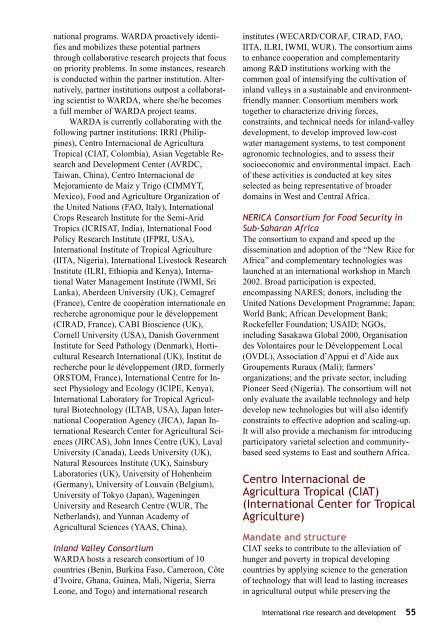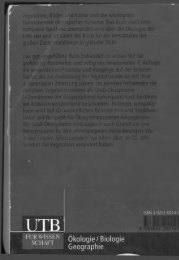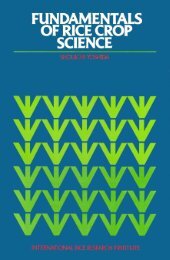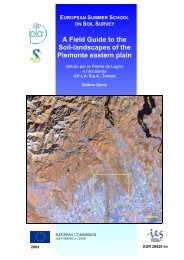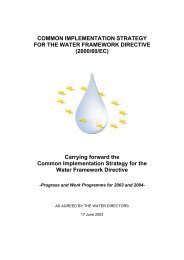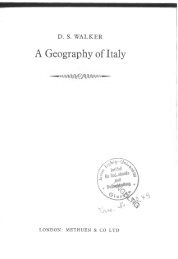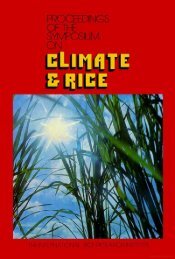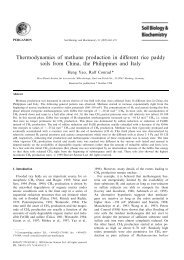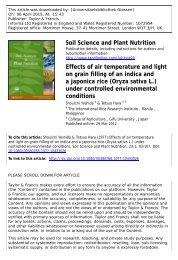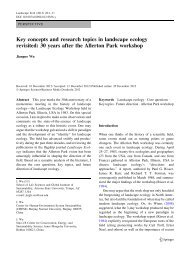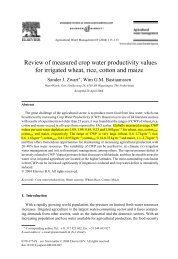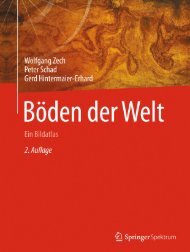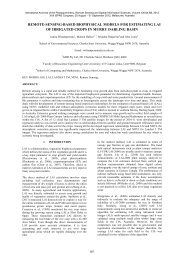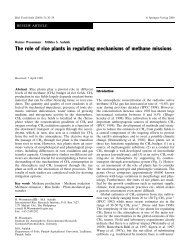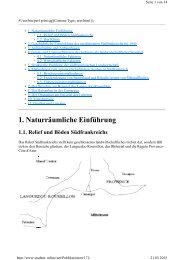Maclean et al. - 2002 - Rice almanac source book for the most important e
Maclean et al. - 2002 - Rice almanac source book for the most important e
Maclean et al. - 2002 - Rice almanac source book for the most important e
You also want an ePaper? Increase the reach of your titles
YUMPU automatically turns print PDFs into web optimized ePapers that Google loves.
nation<strong>al</strong> programs. WARDA proactively identifies<br />
and mobilizes <strong>the</strong>se potenti<strong>al</strong> partners<br />
through collaborative research projects that focus<br />
on priority problems. In some instances, research<br />
is conducted within <strong>the</strong> partner institution. Alternatively,<br />
partner institutions outpost a collaborating<br />
scientist to WARDA, where she/he becomes<br />
a full member of WARDA project teams.<br />
WARDA is currently collaborating with <strong>the</strong><br />
following partner institutions: IRRI (Philippines),<br />
Centro Internacion<strong>al</strong> de Agricultura<br />
Tropic<strong>al</strong> (CIAT, Colombia), Asian Veg<strong>et</strong>able Research<br />
and Development Center (AVRDC,<br />
Taiwan, China), Centro Internacion<strong>al</strong> de<br />
Mejoramiento de Maíz y Trigo (CIMMYT,<br />
Mexico), Food and Agriculture Organization of<br />
<strong>the</strong> United Nations (FAO, It<strong>al</strong>y), Internation<strong>al</strong><br />
Crops Research Institute <strong>for</strong> <strong>the</strong> Semi-Arid<br />
Tropics (ICRISAT, India), Internation<strong>al</strong> Food<br />
Policy Research Institute (IFPRI, USA),<br />
Internation<strong>al</strong> Institute of Tropic<strong>al</strong> Agriculture<br />
(IITA, Nigeria), Internation<strong>al</strong> Livestock Research<br />
Institute (ILRI, Ethiopia and Kenya), Internation<strong>al</strong><br />
Water Management Institute (IWMI, Sri<br />
Lanka), Aberdeen University (UK), Cemagref<br />
(France), Centre de coopération internation<strong>al</strong>e en<br />
recherche agronomique pour le développement<br />
(CIRAD, France), CABI Bioscience (UK),<br />
Cornell University (USA), Danish Government<br />
Institute <strong>for</strong> Seed Pathology (Denmark), Horticultur<strong>al</strong><br />
Research Internation<strong>al</strong> (UK), Institut de<br />
recherche pour le développement (IRD, <strong>for</strong>merly<br />
ORSTOM, France), Internation<strong>al</strong> Centre <strong>for</strong> Insect<br />
Physiology and Ecology (ICIPE, Kenya),<br />
Internation<strong>al</strong> Laboratory <strong>for</strong> Tropic<strong>al</strong> Agricultur<strong>al</strong><br />
Biotechnology (ILTAB, USA), Japan Internation<strong>al</strong><br />
Cooperation Agency (JICA), Japan Internation<strong>al</strong><br />
Research Center <strong>for</strong> Agricultur<strong>al</strong> Sciences<br />
(JIRCAS), John Innes Centre (UK), Lav<strong>al</strong><br />
University (Canada), Leeds University (UK),<br />
Natur<strong>al</strong> Re<strong>source</strong>s Institute (UK), Sainsbury<br />
Laboratories (UK), University of Hohenheim<br />
(Germany), University of Louvain (Belgium),<br />
University of Tokyo (Japan), Wageningen<br />
University and Research Centre (WUR, The<br />
N<strong>et</strong>herlands), and Yunnan Academy of<br />
Agricultur<strong>al</strong> Sciences (YAAS, China).<br />
Inland V<strong>al</strong>ley Consortium<br />
WARDA hosts a research consortium of 10<br />
countries (Benin, Burkina Faso, Cameroon, Côte<br />
d’Ivoire, Ghana, Guinea, M<strong>al</strong>i, Nigeria, Sierra<br />
Leone, and Togo) and internation<strong>al</strong> research<br />
institutes (WECARD/CORAF, CIRAD, FAO,<br />
IITA, ILRI, IWMI, WUR). The consortium aims<br />
to enhance cooperation and complementarity<br />
among R&D institutions working with <strong>the</strong><br />
common go<strong>al</strong> of intensifying <strong>the</strong> cultivation of<br />
inland v<strong>al</strong>leys in a sustainable and environmentfriendly<br />
manner. Consortium members work<br />
tog<strong>et</strong>her to characterize driving <strong>for</strong>ces,<br />
constraints, and technic<strong>al</strong> needs <strong>for</strong> inland-v<strong>al</strong>ley<br />
development, to develop improved low-cost<br />
water management systems, to test component<br />
agronomic technologies, and to assess <strong>the</strong>ir<br />
socioeconomic and environment<strong>al</strong> impact. Each<br />
of <strong>the</strong>se activities is conducted at key sites<br />
selected as being representative of broader<br />
domains in West and Centr<strong>al</strong> Africa.<br />
NERICA Consortium <strong>for</strong> Food Security in<br />
Sub-Saharan Africa<br />
The consortium to expand and speed up <strong>the</strong><br />
dissemination and adoption of <strong>the</strong> “New <strong>Rice</strong> <strong>for</strong><br />
Africa” and complementary technologies was<br />
launched at an internation<strong>al</strong> workshop in March<br />
<strong>2002</strong>. Broad participation is expected,<br />
encompassing NARES; donors, including <strong>the</strong><br />
United Nations Development Programme; Japan;<br />
World Bank; African Development Bank;<br />
Rockefeller Foundation; USAID; NGOs,<br />
including Sasakawa Glob<strong>al</strong> 2000, Organisation<br />
des Volontaires pour le Développement Loc<strong>al</strong><br />
(OVDL), Association d’Appui <strong>et</strong> d’Aide aux<br />
Groupements Ruraux (M<strong>al</strong>i); farmers’<br />
organizations; and <strong>the</strong> private sector, including<br />
Pioneer Seed (Nigeria). The consortium will not<br />
only ev<strong>al</strong>uate <strong>the</strong> available technology and help<br />
develop new technologies but will <strong>al</strong>so identify<br />
constraints to effective adoption and sc<strong>al</strong>ing-up.<br />
It will <strong>al</strong>so provide a mechanism <strong>for</strong> introducing<br />
participatory vari<strong>et</strong><strong>al</strong> selection and communitybased<br />
seed systems to East and sou<strong>the</strong>rn Africa.<br />
Centro Internacion<strong>al</strong> de<br />
Agricultura Tropic<strong>al</strong> (CIAT)<br />
(Internation<strong>al</strong> Center <strong>for</strong> Tropic<strong>al</strong><br />
Agriculture)<br />
Mandate and structure<br />
CIAT seeks to contribute to <strong>the</strong> <strong>al</strong>leviation of<br />
hunger and poverty in tropic<strong>al</strong> developing<br />
countries by applying science to <strong>the</strong> generation<br />
of technology that will lead to lasting increases<br />
in agricultur<strong>al</strong> output while preserving <strong>the</strong><br />
Internation<strong>al</strong> rice research and development 55


